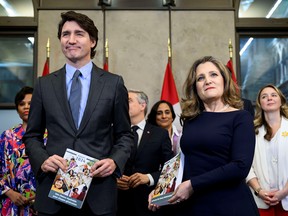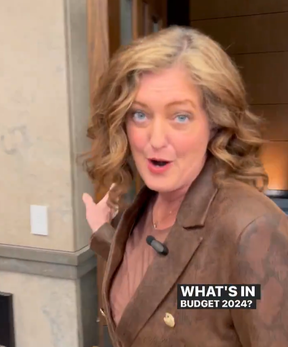That was the budget which became infamous for prescribing higher spending and tighter controls when the exact opposite was needed

Article content
First Reading is a daily newsletter keeping you posted on the travails of Canadian politicos, all curated by the National Post’s own Tristin Hopper. To get an early version sent directly to your inbox, sign up here.
TOP STORY
Article content
The 2024 federal budget dropped just two hours before this newsletter got sent out. So below is a frantic summary. A much more professional rundown is available via the National Post.
Advertisement 2
Article content
First, the main bullet points: Higher deficits, higher spending and higher capital gains taxes. The National Post tallied up $480 billion in program spending with a $40 billion deficit.
Most of the budget’s main points were leaked ahead of time, such as $2.4 billion for “artificial intelligence” and Friday’s surprise pledge to fix housing by 2031. It’s based on these early details that former Bank of Canada governor David Dodge hazarded a guess on Monday night that the 2024 budget was “likely to be the worst budget since the MacEachen budget of 1982.” That particular budget – tabled by finance minister Allan MacEachen in the waning days of the Pierre Trudeau government – became infamous for bringing in a restrictive package of higher taxes and price controls at a time when the economy was already plummeting into recession. As Dodge told CTV, Canada needs increased productivity and lower inflation, both of which you generally get by reducing spending, regulation and taxes. “We’re going in exactly the wrong direction,” he said.
Article content
Advertisement 3
Article content
An increase in the capital gains tax was probably the most significant budget measure that wasn’t leaked ahead of time. Currently, half of all capital gains (money made from selling assets) are tax exempt, while the new budget would drop this to one third. The Liberals pitched this as a “rich people paying their fair share” measure that will bring in about $20 billion in extra revenue over the next five years. The usual critique against capital gains taxes, however, is that they’re a “tax on a tax,” since any asset being sold would have presumably been purchased with income that had already been subject to income taxes (and, like most tax increases, it risks scaring away investment to places with lower taxes).
Budgets are released to the media in what’s known as a “lock-up.” Journalists are given early access to the budget from a special room in which they’re sealed off from any access to the outside world. That way, they can write news stories that get published at the exact same time that the budget is released. Anyways, during this lockup reporters for the Canadian Press found time to count how many times the word “fairness” is mentioned in the budget. It’s mentioned 50 times.
Advertisement 4
Article content
The immediate reaction of NDP Leader Jagmeet Singh to the federal budget was that it would continue “Conservative handouts.” “Justin Trudeau will keep Pierre Poilievre’s $60 billion in taxpayer handouts to corporations,” he wrote on X. It’s not immediately clear what Singh is referencing, given that Poilievre hasn’t been in government since 2015. But it’s likely a reference to Harper-era corporate tax cuts which have indeed been maintained by the Liberals. But the $60 billion figure is way off; that was the estimate for the total tax relief afforded by the cuts over the first seven years of Harper’s government.
Advertisement 5
Article content
Recommended from Editorial
IN OTHER NEWS
If there’s one very important rule about being Governor General of Canada, it’s that you’re not allowed to show any partisan sympathies whatsoever. The foundational rule of constitutional monarchy is that the King (and his representatives) nominally maintain full political control, provided that they never do or say anything partisan and act solely on the advice of the electorate. There’s been wars fought over this and everything. So it’s extremely unusual to see a governor general seeming to endorse a piece of proposed House of Commons legislation – particularly when it’s a highly controversial piece of legislation that would prescribe unprecedented checks on free speech. Over the weekend, Governor General Mary Simon held a symposium at Rideau Hall to discus the crisis of “online hate” and propose “solutions for a safer digital world.” The language is all very similar to government justifications for Bill C-63, the Liberals’ proposed “Online Harms Bill” that, among other things, would prescribe life sentences for hate speech and enable preventative detention of Canadians suspected of future hate speech offences. In fact, the justice minister who tabled Bill C-63, Arif Virani, was even an attendee at the symposium – as were a number of activists who have been vocal about increased curbs on free speech.
Advertisement 6
Article content

Former Israeli prime minister Naftali Bennett was recently in Canada to deliver a keynote speech at the Canada Strong and Free Networking Conference. Although Bennett is a conservative, thanks to the extremely confusing machinations of Israeli politics, his brief tenure as the country’s leader actually saw him at the head of a coalition that included Arab representation and far-left elements. Before returning home, Bennett gave an interview to Global News where he naturally expressed displeasure with Canada’s recent moves to subject Israel to military embargoes. “We expect friends to be with us not when it’s easy, but when it’s tough,” he said.

For most of Canadian history, it was a given that non-Canadians would struggle to name our prime minister. But Justin Trudeau’s international notoriety has become so widespread that foreigners are even starting to note the name of our opposition leader. A recent article in the Australian version of The Spectator profiled Conservative Leader Pierre Poilievre, framing his as a model on how to oppose so-called “woke” politics. “He (Poilievre) takes the fight to politicians on the left; he doesn’t take advice from 30-year-old, risk-averse, careerist advisers who … seem not to believe in anything,” it wrote as a dig at Australia’s own centre-right movement.
Get all of these insights and more into your inbox by signing up for the First Reading newsletter here.
Article content





